Analysis of Parmalat's Corporate Governance Failures and Solutions
VerifiedAdded on 2022/09/28
|5
|1168
|23
Homework Assignment
AI Summary
This assignment analyzes the Parmalat corporate governance failure, identifying three major corporate governance failings: lack of independence of non-executive directors, the same person holding multiple positions, and Parmalat's failure to comply with Italian law regarding independent directors. The assignment explores mechanisms to avoid such failures, including strengthening the board's independence, separating the roles of CEO and chairman, and implementing a code of ethics. The analysis emphasizes the importance of auditors, internal audit committees, non-executive directors, and the board of directors in ensuring good governance. These mechanisms promote fair decision-making, ethical environments, and compliance with ethical codes, which are crucial for stakeholder trust and organizational success. The assignment highlights the significance of an effective compliance process and strong corporate governance practices.
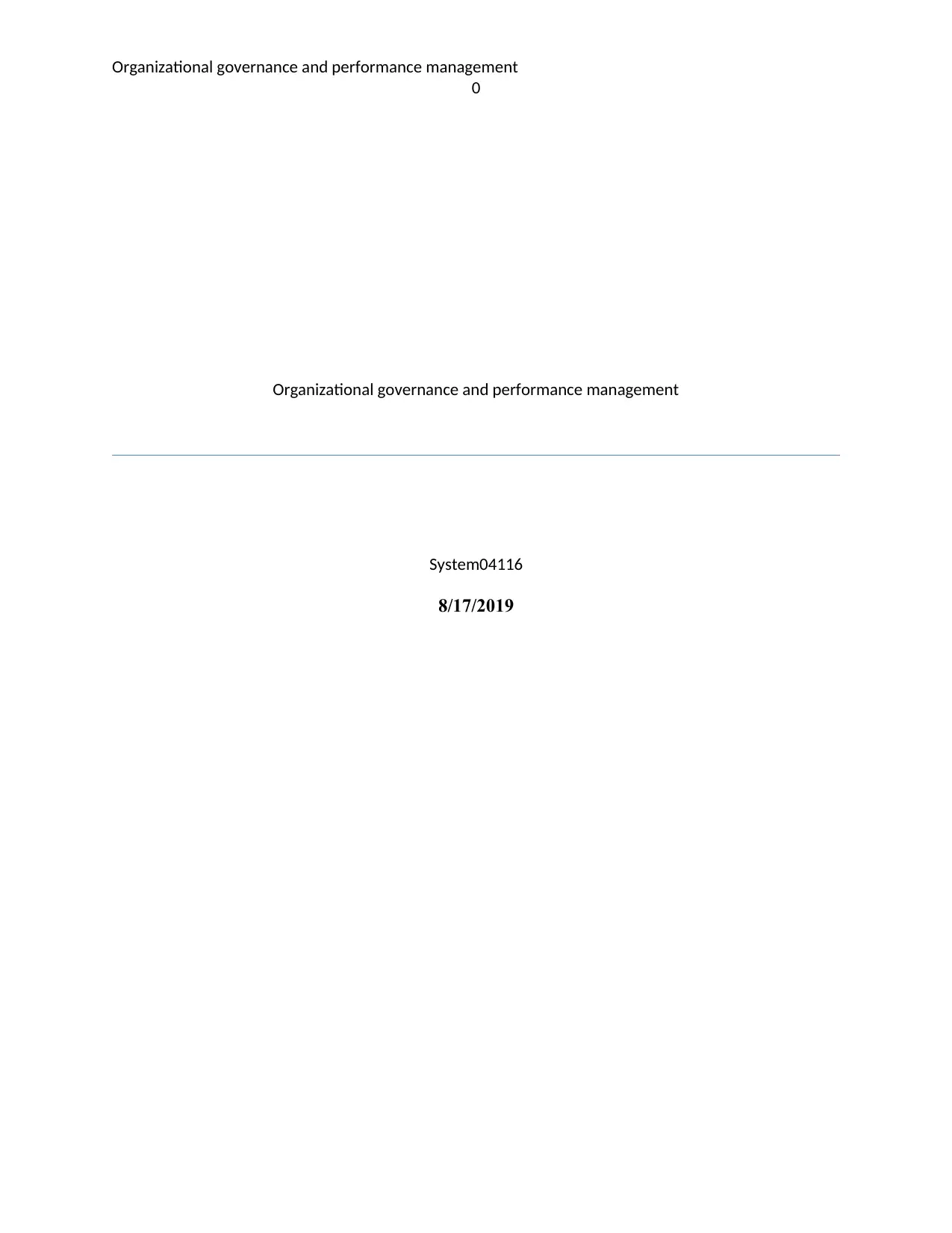
Organizational governance and performance management
0
Organizational governance and performance management
System04116
8/17/2019
0
Organizational governance and performance management
System04116
8/17/2019
Paraphrase This Document
Need a fresh take? Get an instant paraphrase of this document with our AI Paraphraser
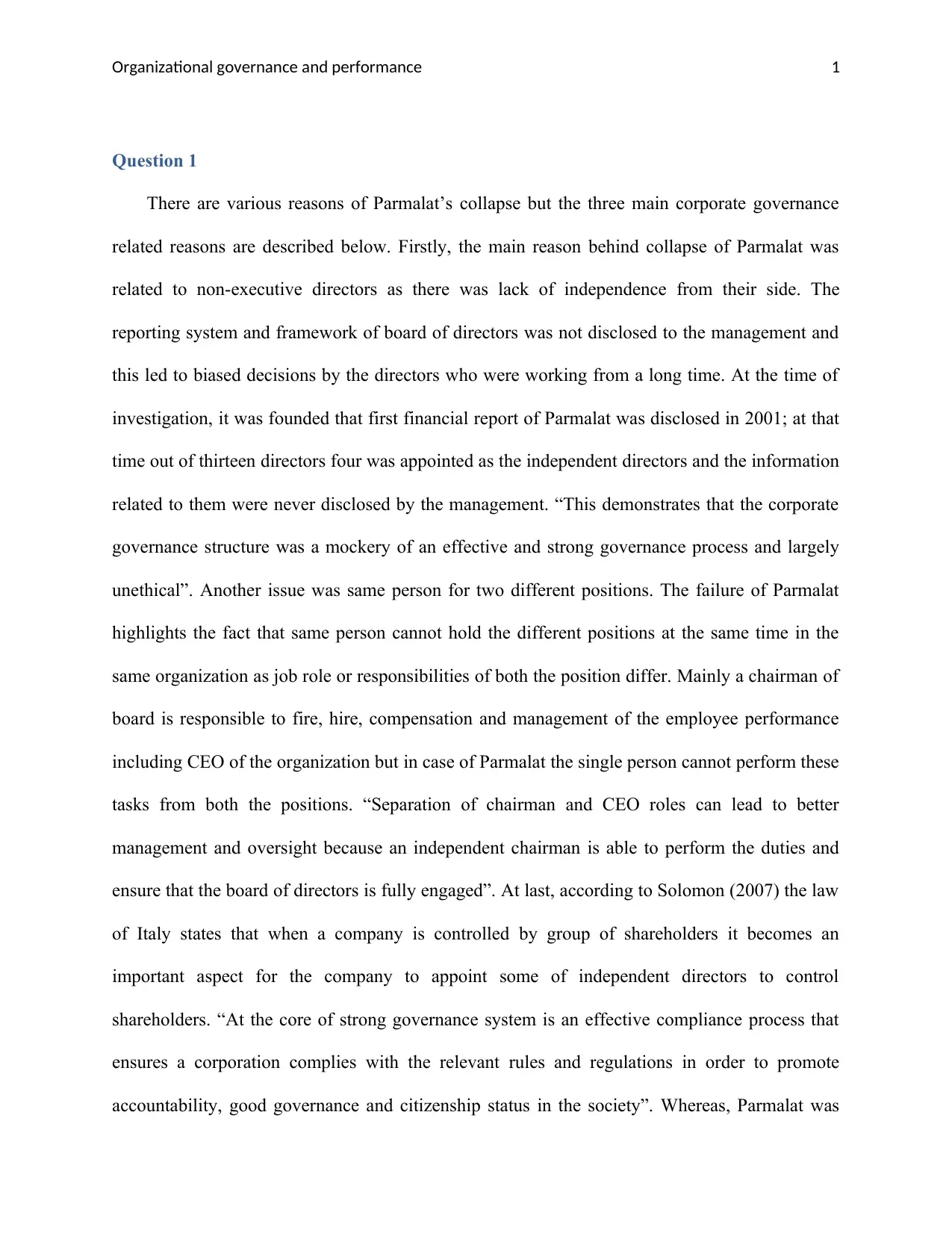
Organizational governance and performance 1
Question 1
There are various reasons of Parmalat’s collapse but the three main corporate governance
related reasons are described below. Firstly, the main reason behind collapse of Parmalat was
related to non-executive directors as there was lack of independence from their side. The
reporting system and framework of board of directors was not disclosed to the management and
this led to biased decisions by the directors who were working from a long time. At the time of
investigation, it was founded that first financial report of Parmalat was disclosed in 2001; at that
time out of thirteen directors four was appointed as the independent directors and the information
related to them were never disclosed by the management. “This demonstrates that the corporate
governance structure was a mockery of an effective and strong governance process and largely
unethical”. Another issue was same person for two different positions. The failure of Parmalat
highlights the fact that same person cannot hold the different positions at the same time in the
same organization as job role or responsibilities of both the position differ. Mainly a chairman of
board is responsible to fire, hire, compensation and management of the employee performance
including CEO of the organization but in case of Parmalat the single person cannot perform these
tasks from both the positions. “Separation of chairman and CEO roles can lead to better
management and oversight because an independent chairman is able to perform the duties and
ensure that the board of directors is fully engaged”. At last, according to Solomon (2007) the law
of Italy states that when a company is controlled by group of shareholders it becomes an
important aspect for the company to appoint some of independent directors to control
shareholders. “At the core of strong governance system is an effective compliance process that
ensures a corporation complies with the relevant rules and regulations in order to promote
accountability, good governance and citizenship status in the society”. Whereas, Parmalat was
Question 1
There are various reasons of Parmalat’s collapse but the three main corporate governance
related reasons are described below. Firstly, the main reason behind collapse of Parmalat was
related to non-executive directors as there was lack of independence from their side. The
reporting system and framework of board of directors was not disclosed to the management and
this led to biased decisions by the directors who were working from a long time. At the time of
investigation, it was founded that first financial report of Parmalat was disclosed in 2001; at that
time out of thirteen directors four was appointed as the independent directors and the information
related to them were never disclosed by the management. “This demonstrates that the corporate
governance structure was a mockery of an effective and strong governance process and largely
unethical”. Another issue was same person for two different positions. The failure of Parmalat
highlights the fact that same person cannot hold the different positions at the same time in the
same organization as job role or responsibilities of both the position differ. Mainly a chairman of
board is responsible to fire, hire, compensation and management of the employee performance
including CEO of the organization but in case of Parmalat the single person cannot perform these
tasks from both the positions. “Separation of chairman and CEO roles can lead to better
management and oversight because an independent chairman is able to perform the duties and
ensure that the board of directors is fully engaged”. At last, according to Solomon (2007) the law
of Italy states that when a company is controlled by group of shareholders it becomes an
important aspect for the company to appoint some of independent directors to control
shareholders. “At the core of strong governance system is an effective compliance process that
ensures a corporation complies with the relevant rules and regulations in order to promote
accountability, good governance and citizenship status in the society”. Whereas, Parmalat was
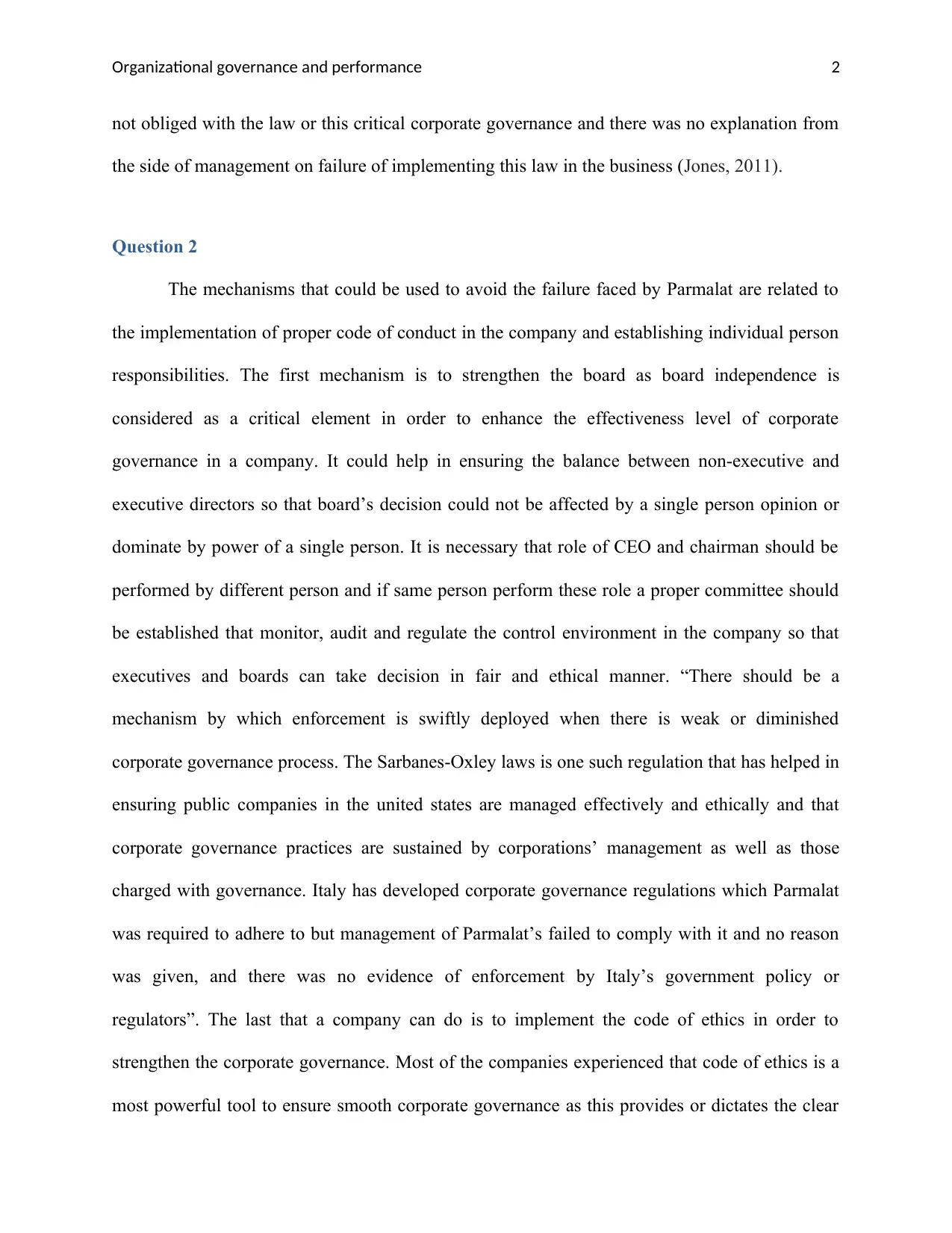
Organizational governance and performance 2
not obliged with the law or this critical corporate governance and there was no explanation from
the side of management on failure of implementing this law in the business (Jones, 2011).
Question 2
The mechanisms that could be used to avoid the failure faced by Parmalat are related to
the implementation of proper code of conduct in the company and establishing individual person
responsibilities. The first mechanism is to strengthen the board as board independence is
considered as a critical element in order to enhance the effectiveness level of corporate
governance in a company. It could help in ensuring the balance between non-executive and
executive directors so that board’s decision could not be affected by a single person opinion or
dominate by power of a single person. It is necessary that role of CEO and chairman should be
performed by different person and if same person perform these role a proper committee should
be established that monitor, audit and regulate the control environment in the company so that
executives and boards can take decision in fair and ethical manner. “There should be a
mechanism by which enforcement is swiftly deployed when there is weak or diminished
corporate governance process. The Sarbanes-Oxley laws is one such regulation that has helped in
ensuring public companies in the united states are managed effectively and ethically and that
corporate governance practices are sustained by corporations’ management as well as those
charged with governance. Italy has developed corporate governance regulations which Parmalat
was required to adhere to but management of Parmalat’s failed to comply with it and no reason
was given, and there was no evidence of enforcement by Italy’s government policy or
regulators”. The last that a company can do is to implement the code of ethics in order to
strengthen the corporate governance. Most of the companies experienced that code of ethics is a
most powerful tool to ensure smooth corporate governance as this provides or dictates the clear
not obliged with the law or this critical corporate governance and there was no explanation from
the side of management on failure of implementing this law in the business (Jones, 2011).
Question 2
The mechanisms that could be used to avoid the failure faced by Parmalat are related to
the implementation of proper code of conduct in the company and establishing individual person
responsibilities. The first mechanism is to strengthen the board as board independence is
considered as a critical element in order to enhance the effectiveness level of corporate
governance in a company. It could help in ensuring the balance between non-executive and
executive directors so that board’s decision could not be affected by a single person opinion or
dominate by power of a single person. It is necessary that role of CEO and chairman should be
performed by different person and if same person perform these role a proper committee should
be established that monitor, audit and regulate the control environment in the company so that
executives and boards can take decision in fair and ethical manner. “There should be a
mechanism by which enforcement is swiftly deployed when there is weak or diminished
corporate governance process. The Sarbanes-Oxley laws is one such regulation that has helped in
ensuring public companies in the united states are managed effectively and ethically and that
corporate governance practices are sustained by corporations’ management as well as those
charged with governance. Italy has developed corporate governance regulations which Parmalat
was required to adhere to but management of Parmalat’s failed to comply with it and no reason
was given, and there was no evidence of enforcement by Italy’s government policy or
regulators”. The last that a company can do is to implement the code of ethics in order to
strengthen the corporate governance. Most of the companies experienced that code of ethics is a
most powerful tool to ensure smooth corporate governance as this provides or dictates the clear
⊘ This is a preview!⊘
Do you want full access?
Subscribe today to unlock all pages.

Trusted by 1+ million students worldwide
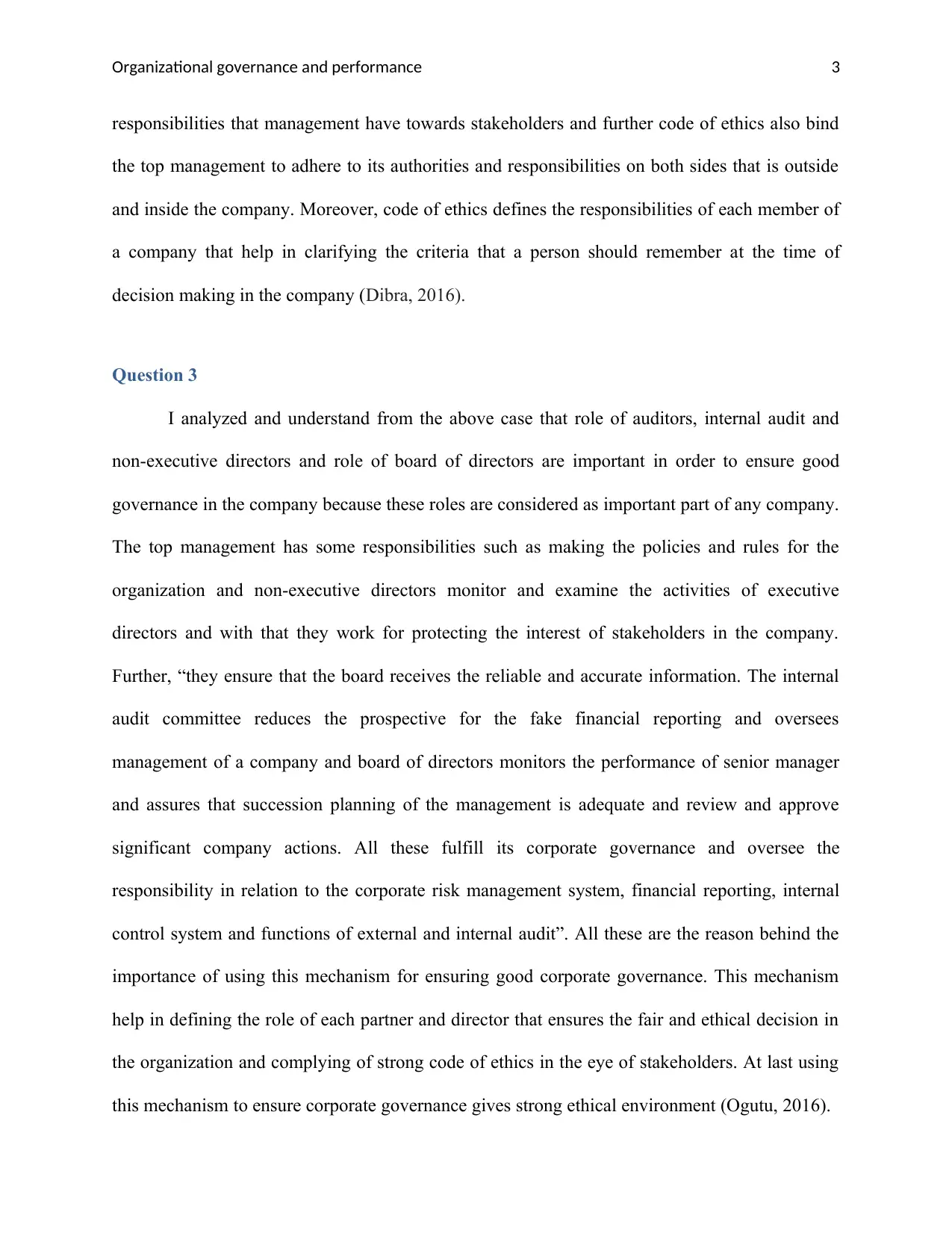
Organizational governance and performance 3
responsibilities that management have towards stakeholders and further code of ethics also bind
the top management to adhere to its authorities and responsibilities on both sides that is outside
and inside the company. Moreover, code of ethics defines the responsibilities of each member of
a company that help in clarifying the criteria that a person should remember at the time of
decision making in the company (Dibra, 2016).
Question 3
I analyzed and understand from the above case that role of auditors, internal audit and
non-executive directors and role of board of directors are important in order to ensure good
governance in the company because these roles are considered as important part of any company.
The top management has some responsibilities such as making the policies and rules for the
organization and non-executive directors monitor and examine the activities of executive
directors and with that they work for protecting the interest of stakeholders in the company.
Further, “they ensure that the board receives the reliable and accurate information. The internal
audit committee reduces the prospective for the fake financial reporting and oversees
management of a company and board of directors monitors the performance of senior manager
and assures that succession planning of the management is adequate and review and approve
significant company actions. All these fulfill its corporate governance and oversee the
responsibility in relation to the corporate risk management system, financial reporting, internal
control system and functions of external and internal audit”. All these are the reason behind the
importance of using this mechanism for ensuring good corporate governance. This mechanism
help in defining the role of each partner and director that ensures the fair and ethical decision in
the organization and complying of strong code of ethics in the eye of stakeholders. At last using
this mechanism to ensure corporate governance gives strong ethical environment (Ogutu, 2016).
responsibilities that management have towards stakeholders and further code of ethics also bind
the top management to adhere to its authorities and responsibilities on both sides that is outside
and inside the company. Moreover, code of ethics defines the responsibilities of each member of
a company that help in clarifying the criteria that a person should remember at the time of
decision making in the company (Dibra, 2016).
Question 3
I analyzed and understand from the above case that role of auditors, internal audit and
non-executive directors and role of board of directors are important in order to ensure good
governance in the company because these roles are considered as important part of any company.
The top management has some responsibilities such as making the policies and rules for the
organization and non-executive directors monitor and examine the activities of executive
directors and with that they work for protecting the interest of stakeholders in the company.
Further, “they ensure that the board receives the reliable and accurate information. The internal
audit committee reduces the prospective for the fake financial reporting and oversees
management of a company and board of directors monitors the performance of senior manager
and assures that succession planning of the management is adequate and review and approve
significant company actions. All these fulfill its corporate governance and oversee the
responsibility in relation to the corporate risk management system, financial reporting, internal
control system and functions of external and internal audit”. All these are the reason behind the
importance of using this mechanism for ensuring good corporate governance. This mechanism
help in defining the role of each partner and director that ensures the fair and ethical decision in
the organization and complying of strong code of ethics in the eye of stakeholders. At last using
this mechanism to ensure corporate governance gives strong ethical environment (Ogutu, 2016).
Paraphrase This Document
Need a fresh take? Get an instant paraphrase of this document with our AI Paraphraser
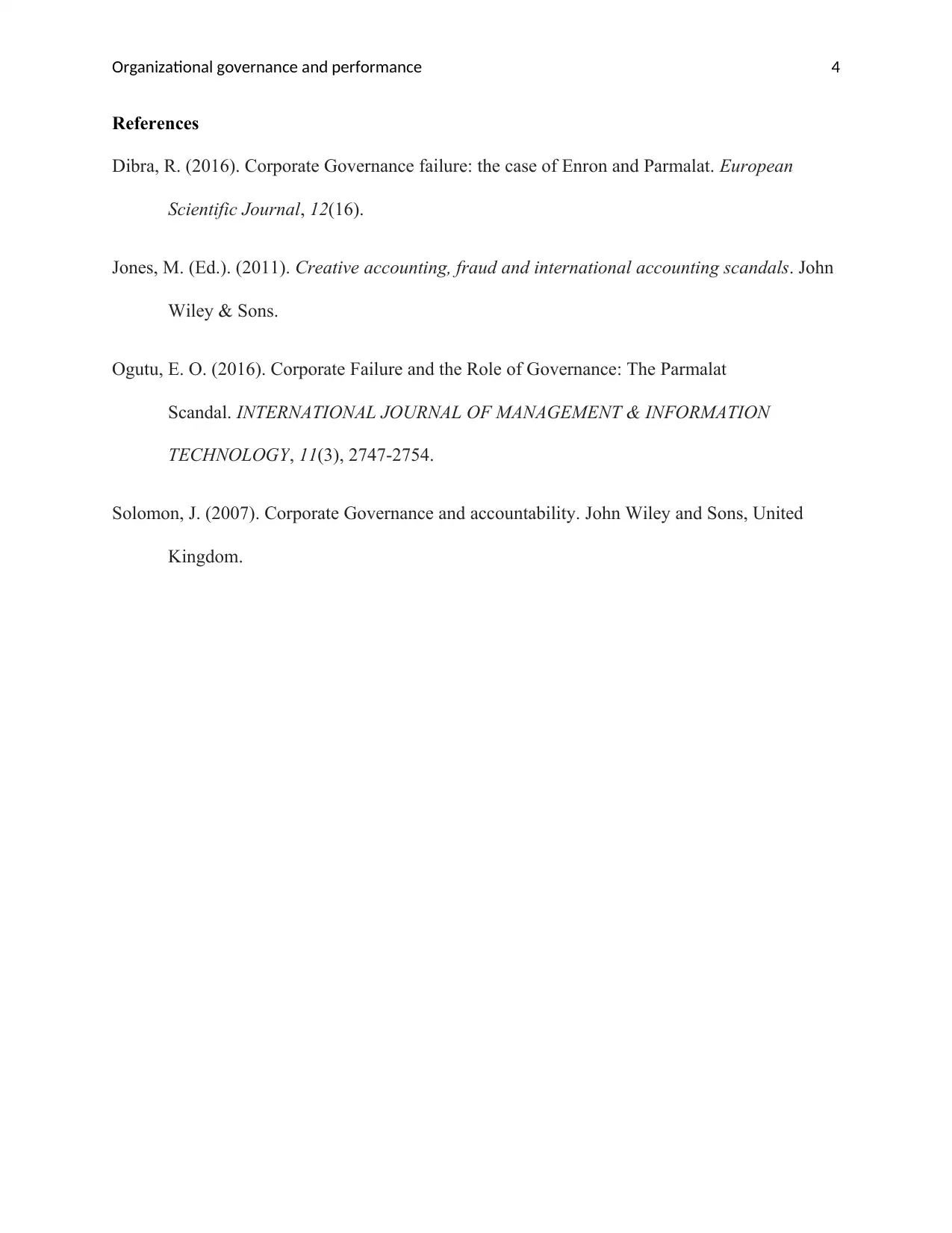
Organizational governance and performance 4
References
Dibra, R. (2016). Corporate Governance failure: the case of Enron and Parmalat. European
Scientific Journal, 12(16).
Jones, M. (Ed.). (2011). Creative accounting, fraud and international accounting scandals. John
Wiley & Sons.
Ogutu, E. O. (2016). Corporate Failure and the Role of Governance: The Parmalat
Scandal. INTERNATIONAL JOURNAL OF MANAGEMENT & INFORMATION
TECHNOLOGY, 11(3), 2747-2754.
Solomon, J. (2007). Corporate Governance and accountability. John Wiley and Sons, United
Kingdom.
References
Dibra, R. (2016). Corporate Governance failure: the case of Enron and Parmalat. European
Scientific Journal, 12(16).
Jones, M. (Ed.). (2011). Creative accounting, fraud and international accounting scandals. John
Wiley & Sons.
Ogutu, E. O. (2016). Corporate Failure and the Role of Governance: The Parmalat
Scandal. INTERNATIONAL JOURNAL OF MANAGEMENT & INFORMATION
TECHNOLOGY, 11(3), 2747-2754.
Solomon, J. (2007). Corporate Governance and accountability. John Wiley and Sons, United
Kingdom.
1 out of 5
Related Documents
Your All-in-One AI-Powered Toolkit for Academic Success.
+13062052269
info@desklib.com
Available 24*7 on WhatsApp / Email
![[object Object]](/_next/static/media/star-bottom.7253800d.svg)
Unlock your academic potential
Copyright © 2020–2026 A2Z Services. All Rights Reserved. Developed and managed by ZUCOL.





